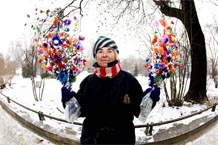Christmas for Bulgaria because of corruption
 Sofia - Bulgarian officials complained how the European Union stole their Christmas when it cancelled hundreds of millions of dollars in subsidies because of fraud, but instead of putting thieves in prison, they blamed the global financial crisis.
Sofia - Bulgarian officials complained how the European Union stole their Christmas when it cancelled hundreds of millions of dollars in subsidies because of fraud, but instead of putting thieves in prison, they blamed the global financial crisis.
After repeated warnings to its poorest member-state that subsidies aimed at improving the life of Bulgarians were being drained as a result of fraud, the EU in July suspended the payment of 486 million euros for various projects and demanded action from Prime Minister Sergey Stanishev's cabinet.
Almost half of the money - in total 220 million euros - was ultimately cancelled entirely after no significant changes were achieved by Brussels' deadline of November 30.
"I couldn't think of a worse Christmas gift for the Bulgarian economy," said Ivo Prokopiev, head of the national organization of employers and industrialists.
Prokopiev suggested that control over EU funds in Bulgaria should be turned over to outsiders, as was done under the previous government.
Stanishev accused the EU of applying double standards and "not treating our country as the other members." He also blamed the media for "tarnishing" the country's image.
His cabinet moved to put on a brave face over the loss at a bad time, and went on to declare it would finance projects affected by the EU decision from the state budget.
Dismissing Brussels decision as "regrettable" and "unjust", Bulgarian leaders also tried to pin the loss of funding on the global financial crisis and accused the EU of being motivated by ulterior motives.
"The European Commission decision was influenced by upcoming EU elections," Interior Minister Mikhail Mikov said a day after the announcement in Brussels, while the deputy premier in charge of European funds, Meglena Plugchieva, said she felt "cheated."
President Georgi Parvanov even accused the EU of "keeping Bulgaria hostage" in its internal power struggles.
Bulgaria's inability to curb corruption in its own institutions did not come as a surprise. In fact, the EU had allowed Sofia to join the bloc without meeting all criteria, particularly in law implementation.
Among the leading complaints are that courts are bribed and inefficient, and unable to deal with the powerful, all-corrupting organized crime. As a result, virtually no criminal of any stature and with enough money goes to jail, critics agree.
Even murderers walk free: Not one of the more than 100 mafia-style killings throughout Bulgaria since 2000 have been resolved to this day.
The European anti-fraud agency, OLAF, has been tipping Bulgaria of cases involving embezzlement of EU funds over the past few years, but little was done to stop the leeching and much less to punish thieves, as only the first trial started in late October.
The head of OLAF, Franz-Hermann Bruener, recently visited Sofia to press for trials of people caught red-handed. Without the prosecution of criminals, he warned, Bulgaria may lose the battle against organized crime.
"Without real convictions, Bulgaria's battle against corruption may come into doubt," Bruener said a week before Brussels announced it was erasing 220 million euros previously planned for Bulgaria in a bid to send a clear signal to Sofia officials.
Western experts believe that many Bulgarian officials actually did not want to see the signs because they kept their own schemes with EU funds going.
Former interior and finance ministers, Rumen Petkov and Rumen Ovcharov, were forced to step down in the wake of reports linking them to figures from the realm of organized crime.
Some EU investigators also suspect that corruption in Bulgaria reaches very high into the state's administration - which would explain why the leaders in Sofia accuse the Grinch for stealing Christmas instead of cracking down on possible thieves among their midst. (dpa)